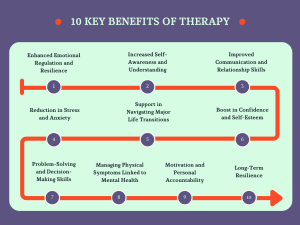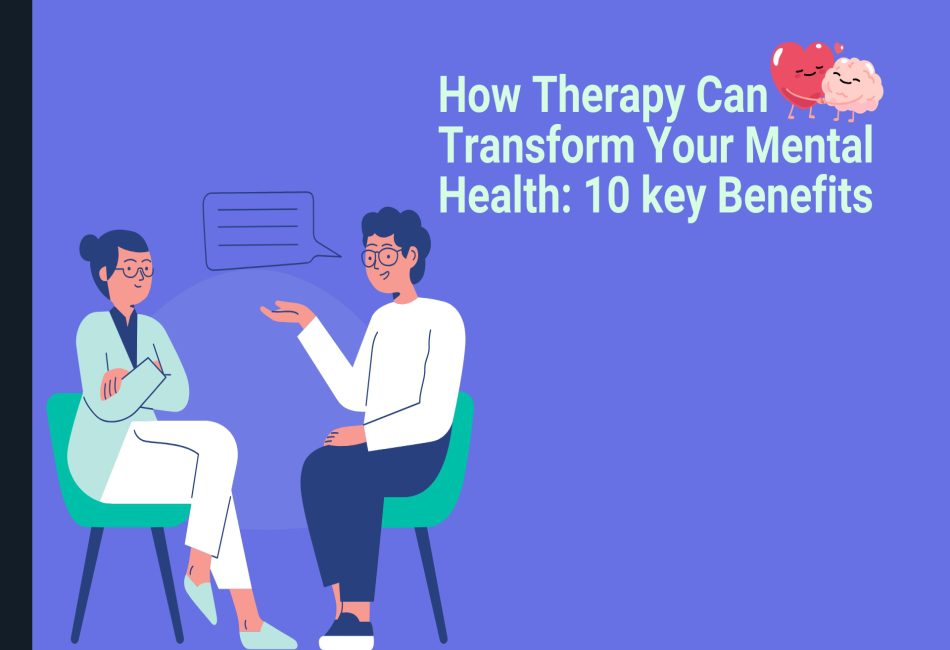Are you curious about how therapy might bring positive change to your life? Therapy is more than just talking—it’s a path to understanding yourself more deeply, building resilience, and finding fresh ways to handle life’s challenges. Whether you’re looking to reduce stress, improve your relationships, or gain control, therapy offers valuable tools to enhance your mental well-being.
In this blog, we’ll explore 10 powerful benefits of therapy that can help you thrive emotionally and mentally, regardless of your journey.
The Transformative Power of Therapy
Therapy has proven to be a transformative journey that extends beyond addressing surface-level issues. It is about emotional resilience, self-awareness, and the right tools to lead a full life. According to the research, about 75% of people who receive therapy report significant improvement in their well-being. With benefits such as better self-understanding, improved relationships, and a significant reduction in stress and anxiety, therapy forms a pathway to the eventual change in mental health.

1. Enhanced Emotional Regulation and Resilience
One of therapy’s significant contributions is teaching individuals effective ways to manage intense emotions. Rather than being overwhelmed by feelings, therapy offers tools to approach emotions with control, helping you respond rather than react. Emotional resilience is a valuable skill that empowers individuals to face life’s stressors with confidence and calm.
For those interested in getting support in building the means to resilience, staying within a residential therapy program provides a directed space for development. Such programs are useful for people with complex emotional needs because they build long-lasting regulation of emotions and bring together mental health stability.
With this knowledge, people will learn to develop resilience, which benefits their mental health and everyday life.
2. Increased Self-Awareness and Understanding
Counseling uncovers profound comprehension of your thoughts and actions. From what you learn in every session, therapists provide strategies and models that force one to reflect on his own landscape, deepening self-awareness. This is a foundation of personal growth and decision-making aligned with their values.
Many of them found that this raised level of awareness could help them address unconscious patterns, possibly unknown for years. Therapy for mental health is more than just working through immediate issues; it’s about empowering the individual through knowledge about themselves, not just helping one’s way out of present concern.
3. Improved Communication and Relationship Skills
Healthy relationships are fundamental to a fulfilling life, and therapy does play a great role in strengthening interpersonal skills. It doesn’t matter if that is with family, friends, or work; therapy teaches active listening, empathy, and proper boundary establishment.
With improved communication skills, you’re better placed to improve as an individual and enhance relationships by expressing how you feel to people and having the ability to resolve conflicts constructively.
4. Reduction in Stress and Anxiety
Therapy can give you practical ways of controlling and reducing sources of stress and anxiety. Most therapies like mindfulness and relaxation exercises, prepare you to face day-to-day tensions calmly. Some individuals also explore natural stress-relief options from Budpop to complement therapy and promote a deeper sense of relaxation.
Therapists often introduce techniques for managing anxiety, such as breathing exercises or visualization methods, to help you respond to stress effectively. Complementary tools like calming supplements including magnesium glycinate (available at:https://www.amazon.com/
5. Support in Navigating Major Life Transitions
Major life changes like a career change, relocation, or loss cause instability and uncertainty. Hence, therapy is just what you need during transitions, helping you adapt to new circumstances and build up the resilience to flourish.
Many therapists are skilled at guiding clients through life transitions, making therapy an important resource during this time. For those experiencing such major shifts, maintaining a good mental foundation is essential for continuing their therapy.
6. Boost in Confidence and Self-Esteem
One of the most significant benefits of therapy is the creation of a healthy self-image. Therapists help clients overcome self-doubts and work through negative thoughts, creating a better outlook.
Therapy enables individuals to create a feeling of self-worth, which leads to greater self-esteem. Through eradicating and eliminating negative talk against oneself, the client will have a healthier self-perception that will contribute to a better mental condition.
7. Enhanced Problem-Solving and Decision-Making Skills
Therapy makes you more perceptive in analyzing situations and more convincing in your decisions. This is because, with a therapist, you get to relate things from other people’s perspectives, making you really effective in your approach to solutions.
By improving these skills, therapy can benefit both personal and professional aspects of life. Many find that therapy enhances their decision-making abilities, helping them face situations with clarity and confidence.
8. Better Management of Physical Symptoms Linked to Mental Health
There is a good mind-body relationship, and therapy often leads to better physical well-being. Resolving issues regarding mental health decreases symptoms of insomnia, fatigue, and high blood pressure. This improvement in physical health is a significant benefit of therapy, showing how mental wellness contributes to overall well-being.
For people looking to enhance their overall health, therapy is the best option. Mental health and physical health are directly interlinked, so an improvement in one is often seen as an improvement in the other.
9. Increased Motivation and Personal Accountability
Therapy often sets a goal for an individual to be self-disciplined, leading to improved motivation. If one takes personal accountability for their development, then there is a chance of getting good goals.
Therapists encourage clients to stay committed to their growth, renewing their sense of purpose. Therapy makes you learn the skills of personal accountability and, in the long run, brings a significant change in life.
10. Long-Term Resilience
Therapy provides tools and information that extend beyond the session, giving you a growth mindset. This means therapy not only effectively solves current issues but also prepares you to be good in the future when life’s uncertainties surface. Therapy for resilience building gives you skills for maintaining mental wellness throughout life.
The best gift of therapy is developing long-term resilience, where individuals learn to approach life proactively when it’s full of uncertainties.
FAQs
1. What are the main benefits of therapy for mental health?
Improved self-awareness, emotional regulation, resilience, and reduced stress and anxiety.
2. How long does it take to see results from therapy?
Positive changes can start after a few sessions, but progress varies.
3. Is therapy beneficial even if I don’t have a mental health diagnosis?
Yes, therapy can help with personal growth, stress management, and improved relationships.
Conclusion: Embracing the Transformative Power of Therapy
Therapy isn’t just support—it’s a path to lifelong mental wellness. Therapy builds resilience, emotional equilibrium, and confidence which elevates every aspect of one’s life. These ten benefits portray just how treatment actually brings home mental health improvements and truly warrants an investment in yourself.
If you’re ready for these changes, consider a residential therapy program for structured support. Therapy can be your ticket to a healthy and more fulfilling life; getting started is easier than it appears.
Ready to start? Find a therapist to match your goals, or check out programs for continuing support. Start your journey today and discover for yourself the transformative power of therapy.
